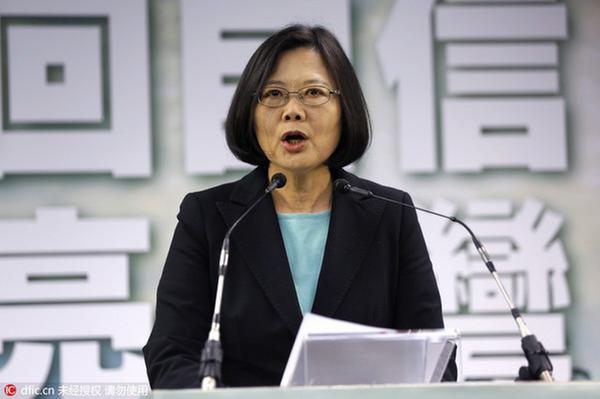Taiwan leader shows she is out of touch with reality
China Daily | Updated: 2017-06-29 07:24
 |
| Taiwan's main opposition Democratic Progressive Party, DPP, Chairperson Tsai Ing-wen speaks during a press conference in Taipei, Taiwan, April 15, 2015. [Photo/IC] |
Slightly more than 13 months in office, the approval rating of Taiwan leader Tsai Ing-wen continues to nosedive, and she faces growing questions about her competency.
It is for the island's own good that its residents are finally waking up to the damage her "separatist stance" is doing to the Taiwan economy and are now seeking ways to restore healthy relations with the mainland.
Unfortunately, Tsai and her colleagues who are responsible for this state of affairs and who are in the position to make a difference are still refusing to come to their senses. Instead, they appear even more intent on pressing ahead with what has proven to be so wrong and harmful.
To the rising calls that they reflect on their refusal to uphold the 1992 Consensus, which has proved to be the reliable foundation for cross-Straits rapport, and recognize one China is the precondition for improving ties, Tsai and her team continue to turn a deaf ear.
Not only that, Tsai and a number of her fellow Democratic Progressive Party politicians have expressed the idea that to "not give in" is the only way Taiwan can deal with the conundrum they have created.
It is the refusal of Tsai and her party to uphold the one-China principle that has caused the problems, by putting an end to the cross-Straits rapprochement and subsequent "diplomatic truce" established by both sides of the Straits when her predecessor Ma Ying-jeou and the Kuomintang were in office.
However, Tsai and her like-minded secessionists are dumping the blame on Beijing - accusing it of squeezing the "international living space" for the island, after Panama became the latest country to shift diplomatic recognition to Beijing on June 13.
That accusation is simply unfounded. While their belief that "as long as Taiwan does not succumb, the mainland will give in" is out of touch with reality.
As are Tsai's idea to arm the local security forces with self-developed missiles and "defend" the island against an "invasion" by the mainland, and some die-hard anti-mainland elements' clamor to develop nuclear weapons. Although these could lead to actual conflict and inflict real harm.
By pursuing their fool's paradise with such talk, the "independence" seekers on the island are creating a dangerous state of affairs.
The peace and friendly interaction between Taipei and Beijing during the Ma Ying-jeou years showed the 1992 Consensus is the formula for healthy and mutually beneficial relations, and the guarantee for peaceful co-existence. This is something Tsai and her colleagues need to recognize.
























